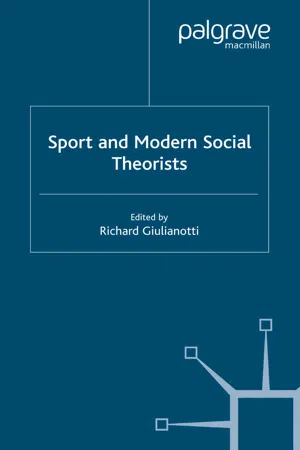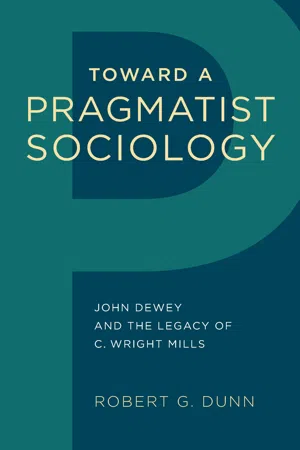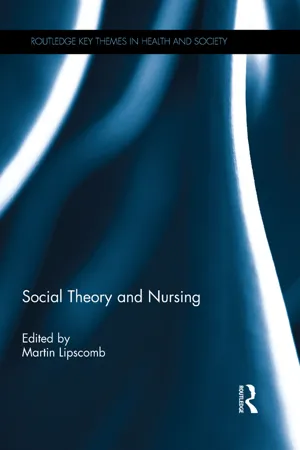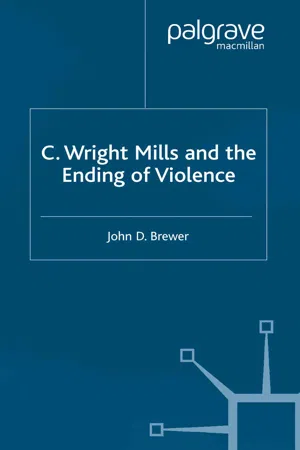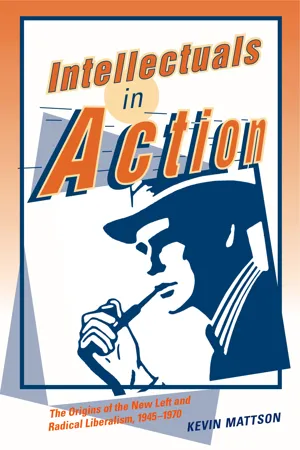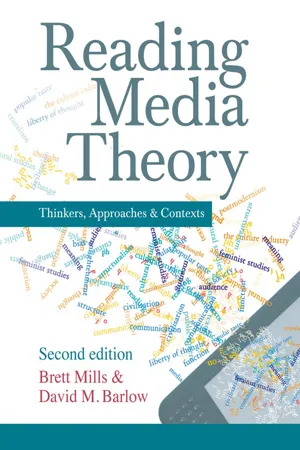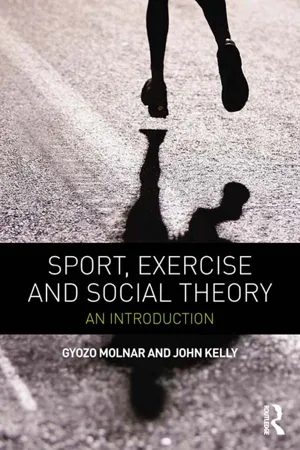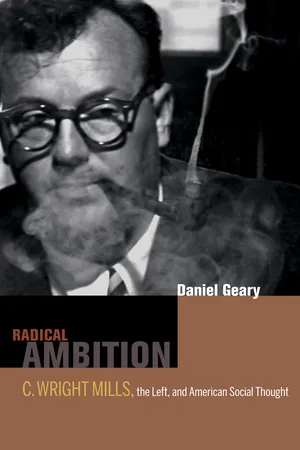Social Sciences
C. Wright Mills
C. Wright Mills was a prominent sociologist known for his concept of the sociological imagination, which emphasizes the intersection of personal troubles and public issues. He argued that individuals should connect their personal experiences to larger social and historical forces to understand the broader societal implications. Mills' work has had a significant impact on the field of sociology and continues to influence social science research and theory.
Written by Perlego with AI-assistance
Related key terms
1 of 5
12 Key excerpts on "C. Wright Mills"
- eBook - PDF
- Richard Giulianotti(Author)
- 2004(Publication Date)
- Palgrave Macmillan(Publisher)
65 4 Consciousness, Craft, Commitment: The Sociological Imagination of C. Wright Mills John Loy and Douglas Booth A prominent critic of American life and the orthodoxies of American sociology in the 1950s, C. Wright Mills today wears the mantle of the father of radical sociology (Scimecca, 1977, p. 111). Summing up Mills’ life and work, Eldridge (1983, p. 112) pays tribute to his “innovative work in the sociology of knowledge” 1 and his intellectual influence on his contemporaries. He also acknowledges the range of studies completed by Mills “in what was, after all, quite a short working life” (Eldrige, 1983, p. 112). Mills’ major works broadly relate to the study of power and social stratification. They include The New Men of Power (1948), White Collar (1956a), and The Power Elite (1956b). In the words of his principal biographer, Irving Horowitz, “Mills remains an engrossing figure for the social sciences and for American letters no less because of any uniquely inspiring concept or well-turned pithy phrase than because of his persistent belief that the qualities of intensity, purpose, and judgment must be brought front and center into the discourse of social research” (1983, p. 330). C. Wright Mills: biographical sketch Horowitz is not alone in noting Mills’ intensity and purpose. Supporters and critics alike refer to these traits that were evident at an early age and that manifested in a man who felt “a deep alienation from America, its ethos, its politics, its way of life” (Miliband, 1968, p. 4). Born in Waco, Texas, on 28 August 1916, Charles Wright Mills 2 was the second child and only son in a middle-class Catholic family. He attended parochial and public schools in Sherman, Fort Worth and Dallas. Even as a boy, Mills “possessed a tenacious faith in his own abilities” and he never 66 Sociological Imagination of C. Wright Mills shied from “stand[ing] up to adults, teachers, and principals when he thought he was right” (Scimecca, 1977, p. 9). - eBook - PDF
Toward a Pragmatist Sociology
John Dewey and the Legacy of C. Wright Mills
- Robert G. Dunn(Author)
- 2018(Publication Date)
- Temple University Press(Publisher)
2 C. Wright Mills and the Tradition of Social Criticism T he “promise” of sociology that C. Wright Mills describes in the opening of The Sociological Imagination (1961, chap. 1) can be thought of in a variety of ways. What most immediately comes to mind, however, is the scope and diversity of the field and the power of sociological explanation. While its breadth of subject matter might seem a liability, the reach and versatility of sociology offers, as Mills rightly saw, the possibility of a comprehensive picture of society and the lives of its members. Mills’s own work exemplifies the creative potentials of the socio-logical perspective, demonstrating how it can illuminate the relation-ship between individual and society, actor and structure, social life and history. Mills believed that sociology ought to be used to further our understanding of social life and human beings as products of “historical social structures” (1961, 21). Focusing on “character” and “social structure” (Gerth and Mills 1964), Mills throughout much of his writing sought to portray individuals in terms of the histori-cally specific social and cultural patterns within which they lived and acted. For Mills, sociology’s “promise” resided in what he called “the sociological imagination . . . which enables us to grasp history and bi-ography and the relations between the two within society” (1961, 6). 28 Chapter 2 Mills made good use of sociology’s porous boundaries and the field’s capacity for empirical discovery. He astutely navigated the so-cial sciences’ common borders, believing that disciplinary specializa-tion was largely an artifice of professionalization that fragmented our knowledge and understanding. Indeed, Mills was in a sense ahead of his time in cultivating the practice of “interdisciplinary” work, al-though this term certainly does not describe his approach. - eBook - ePub
- Martin Lipscomb(Author)
- 2016(Publication Date)
- Routledge(Publisher)
3 C. Wright Mills and the sociological imaginationGary RolfeIntroduction
The back-cover blurb for a volume of the selected writings of C. Wright Mills describes him approvingly as ‘a radical public intellectual, a tough talking, motorcycle-riding anarchist from Texas who taught sociology at Columbia University’ (Summers 2008). His academic qualifications included a bachelor’s degree in sociology, a master’s degree in philosophy and a PhD on the American pragmatist philosophers which clearly influenced much of his later work. He spent most of his teaching career at Columbia University in New York, and died in 1962 at the age of 45 following a series of heart attacks. In a biographical note, Summers (2008) observes that ‘He experimented with organic farming, architecture, photo graphy, marriage, and motorcycling’, and it is generally thought that his prolific and somewhat reckless academic and personal lifestyle was partly a result of his awareness that he would not live a long life.During his brief academic career, Mills published a number of influential books on substantive sociological issues, including The New Men of Power (1948), White Collar (1951) and The Power Elite (1956). However, it is his writing on the nature and methods of the social sciences that is of particular relevance to the scholarship and practice of nursing. These works include his book The Sociological Imagination (1959), the stated aim of which was ‘to define the meaning of the social sciences for the cultural tasks of our time’ (Mills 1959, p.18), along with a number of papers and published lectures. Chief among these is the monograph On Intellectual Craftsmanship, written in 1952 as a guide to scholarship for his doctoral students and later published in revised form as an appendix to The Sociological Imagination.1For better or worse, academic nursing has aligned itself with the methods and methodologies of the social sciences. A brief glance at the contents pages of most nursing research texts will reveal a catalogue of classic social-research methods, and as Lipscomb points out in the introduction to this book, nurse academics and researchers draw regularly, if somewhat naively, on social theory and sociological ideas. Nursing entered the academy comparatively recently, and given that the discipline of sociology has had a head-start of nearly a century on academic nursing, it is not inconceivable that the observations made by Mills about the state of the social sciences in the 1950s might have some resonance for nursing sixty years later. Indeed, I hope to demonstrate that the academic discipline of nursing has much to learn from Mills’ diagnosis of the nature of the malaise of the social sciences in the mid-twentieth century, along with his prescription for restoring them to full health. - eBook - PDF
Practising Social Work Sociologically
A Theoretical approach for New Times
- Priscilla Dunk-West, Fiona Verity(Authors)
- 2018(Publication Date)
- Bloomsbury Academic(Publisher)
PRACTISING SOCIAL WORK SOCIOLOGICALLY 34 C. Wright Mills’ sociological imagination Whilst we have talked in the first part of this chapter about a certain kind of imagination in social work, we now turn to pick up our second use of imagination, which is a way to see what can be taken for granted. You may be familiar with the phrase a ‘sociological imagination’, coined by the North American sociologist C. Wright Mills writing in the 1950s, and well used in social work literature (Lee, 1994 ; van Wormer, 2002 ). Mills defines a sociological imagination as the awareness of the ‘inter-play of … intimate settings with their larger structural framework’ (1970, p. 179), and attentiveness to how people’s private experiences, or ‘pains’, are connected to the ‘public troubles’ of the times. This is a capacity or sensibility to locate oneself in ‘… reference to the historical structures in which the milieux of … everyday life are organized’ (1970, p. 175). He elaborates: The sociological imagination, I remind you, in considerable part consists of the capacity to shift from one perspective to another, and in the process to build up an adequate view of a total society and its components. It is this imagination, of course, that sets off the social scientist from the mere technician. (1970, p. 232) Each of the social work pioneers in Chapter 2 penned autobiographies, situating themselves in their contexts and times. Alice Salomon neatly captures this spirit of a sociological imagination in her own autobiogra-phy, when she situates her ‘story’ in her historically shaped time: The life of a nation is made up of the lives of individuals, and the fate of the individual, passing his early years in the shelter of the family, gradually spreads out into its nation. - eBook - PDF
- J. Brewer(Author)
- 2003(Publication Date)
- Palgrave Macmillan(Publisher)
This was C. Wright Mills and the Sociological Imagination 33 what characterised the classic tradition of sociology and this is what the discipline’s practitioners had abandoned at the time of Mills’s writing. In Mills’s words (2000 [1959]: 143), the lives of individuals cannot be adequately understood without reference to the institu- tions (political and social) and historical forces within which their biography is enacted, and societies are composed in part of the biographical experiences, historical and contemporary, of the people they comprise. All summaries require expansion, however. It is necessary to unpack some of his terms in order to understand the force of the argument. Mills uses terminology like ‘biography’ and ‘personal milieu’ frequently. By ‘biography’ he means someone’s set of per- sonal and lived experiences, past and present, and by ‘milieu’ he refers to their personal and local social world in microcosm. These two notions are combined in a modern manner to mean what sociologists now refer to as ‘agency’ by people in their ‘everyday life setting’. Mills also makes extensive use of the term ‘social structure’, which he uses in its conventional sociological sense to describe society’s institutional order, although he understands this broadly to encompass military, religious, economic, political and social institu- tions. Translating all of this into modern parlance, people are seen to live and act within a personal milieu, which comprises their every- day life experiences and sets of troubles, yet they do not live as islands within their own social world, but have a sense of something greater than themselves through their awareness both of their social self and the social structure within which they live. This is orthodox agency–structure vocabulary: the social structure has a reality inde- pendent of the actions of individuals but people live out their biography and thereby contribute to the shaping of society. - eBook - PDF
Intellectuals in Action
The Origins of the New Left and Radical Liberalism, 1945–1970
- Kevin Mattson(Author)
- 2002(Publication Date)
- Penn State University Press(Publisher)
He also assessed the traditions upon which a future left could and could not rely. 20 Mills was perhaps best known as a critic of professional social science. To put it simply, he believed that the act of describing social life was an inher- ently moral one. In The Sociological Imagination (1959), a book that drew out the principles behind the sociological inquiry he did throughout the 1950s, Mills explained: “Whether he wants it or not, or whether he is aware of it or not, anyone who spends his life studying society and publishing the re- sults is acting morally and usually politically as well.” Precisely for this rea- son, the sociologist faced an imperative—the demand to communicate find- ings to the people being studied (and therefore to write in a clear and concise way for a wide reading public of fellow citizens). One of his major criticisms of professional social science was that “the sociologist of applied social research does not usually address ‘the public’; he has specific clients with particular interests.” Mills eschewed this sort of specialized writing for small, selective audiences. In all of his own work, he wanted to “take it big,” to make his findings speak to a wider readership committed to political self- understanding. For this reason, he was not accepted as a professional sociolo- gist, but was seen instead as a “popularizer”—a term that took on increas- ingly pejorative tones at this time. 21 20. H. Stuart Hughes, “A Politics of Peace,” Commentary, February 1959, 118. 21. C. Wright Mills, The Sociological Imagination (New York: Oxford University Press, 1959), 79, 102. For the accusations of his being a popularizer, see Jamison and Eyerman, Seeds of the Sixties, 40. On “taking it big,” see Dan Wakefield, “Taking It Big: A Memoir of C. Wright Mills,” Atlantic Monthly, September 1971, and Wakefield’s introduction to C. Wright Mills: Letters and Autobiographical Writings, ed. - eBook - PDF
- George Ritzer(Author)
- 2004(Publication Date)
- SAGE Publications, Inc(Publisher)
In addition, although often claimed by young radical sociologists as the “father of radical sociology,” it was mainly Mills’s critique of mainstream sociology, not his theoretical insights, that had the greatest impact on radical sociological research. Nevertheless, when all is said and done, several of Mills’s early essays remain classics that continue to be cited in the literature. Some of the ideas and findings in the Power Elite have been assimilated into mainstream political sociology. Many of his key ideas, such as the power elite and the sociological imagination, are widely employed. The Sociological Imagination continues to be used in sociology courses to inspire students to think for themselves and see the exciting possibilities that exist within sociology for understanding—and even changing—society. Most of all, though, Mills will endure as a symbol of the upstart, hard-working iconoclast who jumps through all the academic hoops, challenges the mainstream of the discipline, and attempts to reach larger publics on the basis of both his val-ues and ideas. — G. William Domhoff See also Marx, Karl; Parsons, Talcott; Power 504 ——— Mills, C. Wright FURTHER READINGS AND REFERENCES Domhoff, G. William and Hoyt B. Ballard, eds. 1968. C. Wright Mills and the Power Elite. Boston, MA: Beacon. Eldridge, J. E. T. 1983. C. Wright Mills. New York: Tavistock. Mills, C. Wright. 1956. The Power Elite. New York: Oxford University Press. ———. 1959. The Sociological Imagination. New York: Oxford University Press. MINNICH, ELIZABETH Elizabeth Minnich, a graduate faculty member at the Union Institute in Cincinnati, is the author of Transforming Knowledge (1990) . This study pivots around issues of curricular transformation in particular and knowledge construction in general. - eBook - PDF
- Graham Crow(Author)
- 2017(Publication Date)
- Red Globe Press(Publisher)
He regarded his topic as particularly suited to ‘this essay-like way of reasoning together’, because ‘it enables us to bring together an effective variety of viewpoints’ and by doing so the par-ties to the dialogue can further their understanding of the subject. This included the author, who by clarifying the ideas set down ‘becomes aware of ideas he did not even know he had’ (1959: 363–4). This observation can be linked to the more general tenet held by Mills that people’s grasp of their situation was frequently unreliable. In The Sociological Imagination Mills proposed that ‘individuals, in the welter of their daily experience, often become falsely conscious of their social position’ (2000: 5). He also argued that individuals may be unable to identify ‘the “real” motives’ behind their actions because ‘When we are motivated by impulses that are disapproved, we sometimes cannot stand the image of ourselves, so we keep these motives out of our awareness’ (Gerth and Mills 1954: 119, 128). It followed from these propositions that it is problematic to take people’s accounts of themselves as sufficient to understand their actions, and Mills reported that he had ‘never studied any group that had an adequate view of its own social position’ (1969: 230). This included the power elite, whose members were often ‘uncertain about their roles’, partly because they may 93 Charles Wright Mills over time come to accept as true ‘the rhetoric of public relations’ that con-structed their exercise of power as service of the public. Such individuals might in all sincerity believe the ‘equalitarian rhetoric’ that denies the progressive concentration of power, but that did not for Mills make them right to do so. Instead he referred to ‘the higher ignorance’ (1959: 4, 5, 14, 350) of the power elite to draw attention to the extent of the discrepancy between what they said about themselves and the reality of their situation. - eBook - ePub
Reading Media Theory
Thinkers, Approaches and Contexts
- Brett Mills, David M. Barlow(Authors)
- 2014(Publication Date)
- Routledge(Publisher)
A leading critic of American society, Mills produced the majority of his major works during the 1950s. In addition to The Power Elite (1956), these included White Collar: The American middle classes (1951), The Sociological Imagination (1959) and Sociology and Pragmatism: The higher learning in America (1967). Described as a ‘public intellectual’, Mills aimed his writing at a ‘general and educated audience’ (Docherty et al. 1993, cited in Williams 2003 : 15). Mills believed that the object of research and publication was ‘the growth of reason and the emancipation of humanity’, and that this required a critical and empirical sociological approach informed by biography and history (Peters 2003 : 220). In this respect, Mills was sharply critical of approaches to research that relied on highly abstract theorising (‘grand theory’), and methods that were solely dependent on quantitative research techniques (‘abstracted empiricism’) (see, for example, Marshall 1998). His insistence that research should focus on the relationship between the social, personal and political dimensions of people's lives was illustrated in the The Sociological Imagination (1959), where he outlined a view of the world that illuminated connections between private problems and public issues. The same depth and breadth of thinking and analysis are evident when he turns his attention to the mass media in the reading that follows. Mills sees the mass media as integral to his analysis of mass society. Thus, he takes account of the wider social, political and economic structures in America. You will quickly realise that the author ascribes great power to the media and their owners, but makes not one mention of ‘media effects’ (see @ Chapter 14) - eBook - ePub
Sport, Exercise and Social Theory
An Introduction
- Gyozo Molnar, John Kelly(Authors)
- 2013(Publication Date)
- Routledge(Publisher)
Troubles occur within the character of the individual and within the range of his immediate relations with others; they have to do with… those limited areas of social life of which he is directly and personally aware’(Mills, 1959/2000: 8, italics in original). ‘A trouble is a private matter: values cherished by an individual are felt by him to be threatened’(Mills, 1963: 396). By engaging your SI, you can recognise the constant interplay between these two facets of society, which, when appropriately embraced, can lead to a fuller self-discovery. To illustrate the difference betweenBIOGRAPHIC NOTE
If we had to describe C. Wright Mills in one word, rebel would be our choice.3 This critical and iconoclastic thinker was born in 1916 in Waco, Texas to a conventional middle-class family. His father was an insurance broker and his mother a housewife. Mills began his university studies at Texas A & M University but, after one depressing year, he transferred to the University of Texas at Austin, where he completed his undergraduate and master's degrees in philosophy. In 1939, Mills moved to the University of Wisconsin to pursue his doctoral studies, which he carried out under the supervision of Hans H. Gerth, who facilitated Mills'acquaintance with the work of German sociologists. Prior to the completion of his PhD, Mills was offered his first post at the University of Maryland which he accepted but left in 1945. He relocated to Columbia University, where he remained for the rest of his life.Wherever Mills studied or taught, he always ran into and/or created controversy. He constantly and tirelessly battled against anything and everything one could think of. ‘One of the most striking things about Mills was his combativeness: he seemed to be constantly at war’(Ritzer, 1992: 211). Even as a child, he stood up against adults and challenged their views and authority. Mills was no different at university. As a graduate student, he heavily criticised established professors and, later, at Columbia University, his vitriolic comments regarding his fellow academics'work were not favourably received. Also, his vituperative views on Talcott Parsons'work, especially on his writing style, seemed never-ending. Mills was critical both of American social structures and academics trapped in them. Hence, he received support and camaraderie from only a handful of people. To illustrate Mills'fighting spirit, most books on him mention his invitation to the Soviet Union as he was severely critical of the American capitalist system. Whilst Mills accepted the invitation and the celebration, he used the opportunity to put a dent on Soviet political egos by critiquing the wide-spread state oppression in the country. - eBook - PDF
Radical Ambition
C. Wright Mills, the Left, and American Social Thought
- Dan Geary(Author)
- 2009(Publication Date)
- University of California Press(Publisher)
In his writings, Mills often presented himself as an intellectual renegade: the antithesis of a bureaucratic social scientist and a model radical intellectual who told the truth during a time of left-wing defeat. Yet Mills’s efforts alone did not create his legendary status; he acquired that only after his death in 1962. To certain members of the genera-tion reaching maturity during the 1960s, Mills became an important symbol. New Leftists found inspiration to challenge the status quo in Mills’s persona as much as in his writings. As one SDS activist recalled, “You had to know C. Wright Mills,” which required familiarity not only with his ideas, but also with his personal style and the anecdotes told about him. 6 Mills appealed especially to male radicals as an icon of masculine authenticity. 7 To many sociologists of the era, Mills was a crucial symbol of rebellion against the limitations of their discipline. As members of the 1960s generation came to prominence in both radical politics and social science, they retained this idealized image of Mills. Since the 1980s, Mills has also appealed to his proponents as a model Maverick on a Motorcycle? 3 of the “public intellectual,” often said to be a dying breed. Indeed, Mills is a central protagonist of Russell Jacoby’s 1987 book The Last Intellectuals , which introduced the term public intellectual into wide-spread debate. 8 The common interpretation of Mills as a maverick traces the criti-cal power of Mills’s writings directly to his personal iconoclasm, his refusal to work within the parameters of the political categories or sociological thought of his time. Yet Mills’s thought was far more char-acteristic of his era than has been recognized. If we see his ideas as emanating primarily from his heroic personality, then we miss their grounding in larger cultural and political trends. - eBook - ePub
C. Wright Mills and the Criminological Imagination
Prospects for Creative Inquiry
- Jon Frauley(Author)
- 2016(Publication Date)
- Routledge(Publisher)
They enable us – even require us – to formulate or visualize differently the problem at hand and to see that empirical problems always have a conceptual side and conceptual problems have an empirical dimension. Concepts enable sharper but also sometimes blurry imaginings; it is through them that we come to understand and act on the world in particular ways. It is by operating and refining these lenses that we can produce systematic and rigorous descriptions, explanations, understandings and interpretations, and this is why we need to attend to the ‘criminological imagination’ because it will allow us to ‘see’ with more clarity. When Krisberg (1974, 148) invited us to participate in an ‘interchange which [perhaps] will improve the methodology of critical research’, this is what he was alluding to. For Krisberg, Mills’ project was aligned with a sociology of knowledge or philosophy of science (see also Scimecca 1976, 148), and in advocating a ‘rediscovery of C. Wright Mills and his conception of the sociological imagination’ (Krisberg 1974, 159), he, not unlike the contributors to this volume, advocated a Millsian metatheory to inform substantive theory production and empirical research. In rediscovering Mills and for realizing the theoretical and methodological promise of the sociological imagination for criminology, we must take note of three basic types of questions that concern imaginative and critically aware enquiry. Mills (1959, 6–7) called these questions the ‘intellectual pivots’ of thought-provoking, useful and insightful social science
Index pages curate the most relevant extracts from our library of academic textbooks. They’ve been created using an in-house natural language model (NLM), each adding context and meaning to key research topics.
